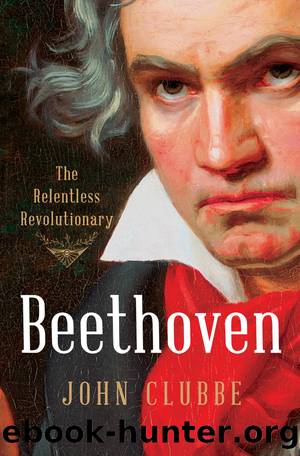Beethoven by John Clubbe

Author:John Clubbe
Language: eng
Format: epub
Publisher: W. W. Norton & Company
Published: 2019-04-29T00:00:00+00:00
The Akademie of December 22, 1808
In mid-1808 Beethoven, to resuscitate his uncertain finances, began to plan an Akademie, or benefit concert for himself, to be given that December. This Akademie surely ranks as one of the pivotal moments in his career. What scholars have neglectedâin fact barely touched uponâis the role Napoleon played in shaping this concert and the repercussions it had for Beethoven. Most studies investigating Beethovenâs response to Napoleon stop with his withdrawal of the dedication to the Eroica in 1804 or soon after. Scholars have often probed Beethovenâs response to the French leader during the years previous to 1804, but for them Beethovenâs emphatic rejection of him in May of that year marks the end of his interest, at least until his death in 1821. But Napoleonâs impact on Beethoven does not cease. In fact in 1804 it had hardly begun. Beethovenâs deeply felt rivalry with Napoleon was virtually a lifelong experience. The figure of Napoleon goads Beethoven to compose music as great in its very different way as the French emperorâs achievements in the military and political realm.
Between October 1806 and October 1810 this rivalry on Beethovenâs part may well have been at its most intense. During these years Napoleon was Europeâs dominant figure. Those in power elsewhere hated or feared him, but others still viewed him as the main hope for social and political change in a Europe ruled arbitrarily by kings. Whatever opinion people held of him or his accomplishments, friend and foe regarded Napoleon as the most brilliant man of the age. Beethoven believed himself, in the realm of music, to be Napoleonâs equal. The Akademie of December 22, 1808, plays a key role in his ongoing competition with Napoleon. A turning point in his life, the Akademie and its extraordinary if contentious aftermath show Beethoven at his irascible, magnificent best, Napoleonâs greatest opponentâand admirer.
In terms of works first performed, this Akademie may be the most significant concert of classical music ever given in Viennaâor for that matter anywhere else. The audience that December day heard seven works, three of whichâthe Fifth and Sixth Symphonies and the Fourth Piano Concertoâare among Beethovenâs acknowledged masterpieces; another, the Choral Fantasy, may well also merit that designation; and a fifth, the Mass in C, long overshadowed by the later Mass in D, is in its own right a splendid achievement. The other two pieces on the program were the concert aria Ah, perfido! and what became the Piano Fantasy, Op. 77. Beethoven composed these works in the middle of what many have referred to as the âheroicâ period that began in the early 1800s, when the composer said he now intended to embark on a ânew path.â
The German word Akademie means a place of study, or a gathering of scholars, as it does in English, but in German it has, as noted earlier, an older sense as well. An Akademie was a concert sponsored by and paid for by an individual, in this case Beethoven, who
Download
This site does not store any files on its server. We only index and link to content provided by other sites. Please contact the content providers to delete copyright contents if any and email us, we'll remove relevant links or contents immediately.
The Goal (Off-Campus #4) by Elle Kennedy(12433)
Kathy Andrews Collection by Kathy Andrews(10520)
Diary of a Player by Brad Paisley(6866)
What Does This Button Do? by Bruce Dickinson(5527)
Assassin’s Fate by Robin Hobb(5237)
Big Little Lies by Liane Moriarty(4880)
Pale Blue Dot by Carl Sagan(4001)
Sticky Fingers by Joe Hagan(3454)
The Heroin Diaries by Nikki Sixx(2932)
The Death of the Heart by Elizabeth Bowen(2901)
Beneath These Shadows by Meghan March(2718)
The Help by Kathryn Stockett(2704)
Confessions of a Video Vixen by Karrine Steffans(2675)
How Music Works by David Byrne(2526)
Jam by Jam (epub)(2489)
Harry Potter 4 - Harry Potter and The Goblet of Fire by J.K.Rowling(2416)
Strange Fascination: David Bowie: The Definitive Story by David Buckley(2367)
Petty: The Biography by Warren Zanes(2237)
Darker Than the Deepest Sea by Trevor Dann(2207)
